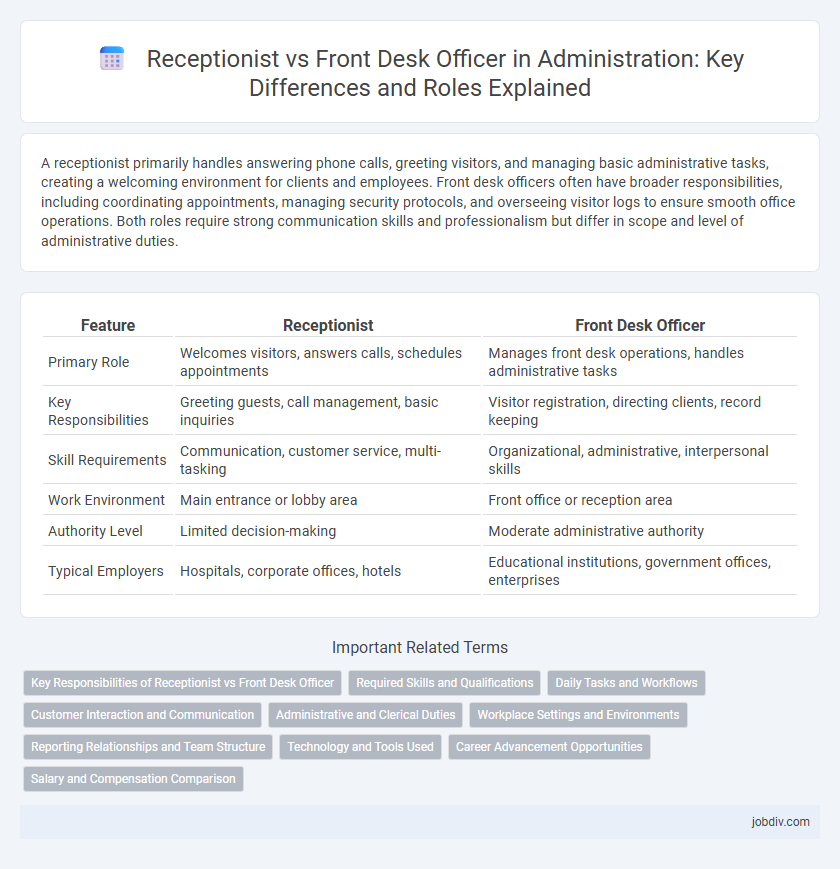A receptionist primarily handles answering phone calls, greeting visitors, and managing basic administrative tasks, creating a welcoming environment for clients and employees. Front desk officers often have broader responsibilities, including coordinating appointments, managing security protocols, and overseeing visitor logs to ensure smooth office operations. Both roles require strong communication skills and professionalism but differ in scope and level of administrative duties.
Table of Comparison
| Feature | Receptionist | Front Desk Officer |
|---|---|---|
| Primary Role | Welcomes visitors, answers calls, schedules appointments | Manages front desk operations, handles administrative tasks |
| Key Responsibilities | Greeting guests, call management, basic inquiries | Visitor registration, directing clients, record keeping |
| Skill Requirements | Communication, customer service, multi-tasking | Organizational, administrative, interpersonal skills |
| Work Environment | Main entrance or lobby area | Front office or reception area |
| Authority Level | Limited decision-making | Moderate administrative authority |
| Typical Employers | Hospitals, corporate offices, hotels | Educational institutions, government offices, enterprises |
Key Responsibilities of Receptionist vs Front Desk Officer
Receptionists primarily manage incoming calls, greet visitors, and handle basic administrative tasks such as scheduling appointments and maintaining records. Front desk officers carry broader responsibilities including managing security access, coordinating office operations, supervising mail distribution, and supporting higher-level administrative functions. Both roles require strong communication skills, but front desk officers often engage in more complex coordination and customer service management.
Required Skills and Qualifications
Receptionists require excellent communication skills, proficiency in multitasking, and basic computer literacy to manage appointments and client inquiries effectively. Front desk officers need advanced organizational abilities, experience with security protocols, and strong problem-solving skills to coordinate visitor access and ensure operational efficiency. Both roles demand a professional demeanor, attention to detail, and familiarity with office software such as Microsoft Office and scheduling systems.
Daily Tasks and Workflows
Receptionists primarily handle answering calls, greeting visitors, and managing appointments, ensuring smooth daily operations at the front desk. Front desk officers perform similar duties but often take on additional responsibilities such as handling administrative paperwork, coordinating with other departments, and managing security protocols. Both roles require strong communication skills and multitasking abilities to maintain efficient workflows in administrative settings.
Customer Interaction and Communication
Receptionists and front desk officers play vital roles in customer interaction and communication, serving as the first point of contact in administration settings. Receptionists typically handle greeting visitors, answering calls, and managing appointments with a friendly and approachable demeanor. Front desk officers often have additional responsibilities, including resolving customer inquiries and facilitating communication between clients and internal departments, ensuring a seamless and professional experience.
Administrative and Clerical Duties
A receptionist primarily handles incoming calls, visitor management, and appointment scheduling, streamlining front office operations to enhance customer experience. In contrast, a front desk officer undertakes broader administrative and clerical duties such as data entry, file management, and coordinating office supplies, ensuring efficient workflow within the organization. Both roles require excellent communication skills and proficiency in office software to maintain organized and professional administrative support.
Workplace Settings and Environments
Receptionists typically work in corporate offices, medical facilities, and hospitality venues, handling visitor management, phone calls, and basic administrative tasks. Front desk officers are often found in hotels, gyms, and residential complexes, focusing on customer service, check-ins, and facility access control. Both roles require strong communication skills but differ in workplace environments and specific operational duties.
Reporting Relationships and Team Structure
Receptionists typically report to the front desk manager or office supervisor and serve as the primary point of contact for visitors and callers. Front desk officers often hold broader responsibilities, overseeing receptionist duties and coordinating with administrative teams to ensure seamless office operations. This hierarchical structure promotes efficient communication flow and task delegation within the administrative support team.
Technology and Tools Used
Receptionists often utilize advanced scheduling software and customer relationship management (CRM) systems to streamline appointments and client interactions. Front desk officers typically employ integrated security systems and property management software to monitor access and manage visitor logs efficiently. Both roles leverage cloud-based communication tools and digital databases to enhance administrative accuracy and operational workflow.
Career Advancement Opportunities
Receptionists often handle basic administrative tasks and customer interactions, providing foundational experience for entry-level positions in office management or customer service. Front desk officers typically manage more complex duties, such as coordinating schedules, handling inquiries, and overseeing visitor management, which can lead to higher-level roles in administrative coordination or office supervision. Career advancement for front desk officers generally includes opportunities for specialization in administrative services, team leadership, or transitioning into executive assistant positions with greater responsibility.
Salary and Compensation Comparison
Receptionists typically earn an average salary ranging from $28,000 to $40,000 annually, while front desk officers can expect slightly higher compensation, often between $32,000 and $45,000 per year. Salary differences stem from job responsibilities, with front desk officers handling more complex administrative tasks and customer service duties. Benefits packages for both positions may include health insurance, paid time off, and performance bonuses, influencing overall compensation competitiveness.
receptionist vs front desk officer Infographic

 jobdiv.com
jobdiv.com